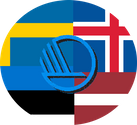Designing services
for a greener future
Information about our project:
The purpose of the project is to set up a long-term cooperation network among 4 upper
secondary schools, situated in Sweden, Latvia, Estonia, and Iceland for exploring new ways of teaching/learning activities related to the Nordic vision that the Nordic region will become the most integrated and green region in the world by 2030.
The application conforms to the overall objectives of Nordplus concerning:
Strengthen and develop Nordic cooperation concerning sustainability in economics, business, and education and help to create a Nordic-Baltic educational area.
Promote innovative green services and processes in education through the systematic
exchange of experiences and good practice of the related soft skills. Develop relevant
competencies and skills for participants to design new greener and more sustainable services in various areas.
Contribute to the development of quality and innovation in the educational systems for life-long learning in the participating Nordplus countries through cooperation in education and training, as well as cooperation with the labor market on development projects, exchange programs, and networking.
Furthermore, our project is well in line with many of the Global goals stated by the UN. Some of these that the current project corresponds to are: life below water; responsible consumption and production; climate action; decent work and economic growth; life on land and quality education.
The target group of the project is secondary school students and teachers. Type of activities that will be implemented will be workshops, lectures, study visits, seminars and cultural/social activities.
All project partners agree that we have the same development needs concerning innovative methods of teaching outside of classrooms, and also the professional development of teachers. The project targets most of the aims of the Nordplus program through networking and cooperation between our four countries, both in the short term and long term. Within the cooperation, we bring up both similarities and differences in our languages, cultures, teaching methodology, and the wish to implement new and innovative learning and teaching skills.
All participants and partners will benefit from the project by raising awareness of how to build sustainable services for a greener future. International networking will contribute to positive development in all of the participating organizations.
The added value related to international cooperation has many outcomes, such as social
networks and business networks, but also the improved understanding of each other’s culture, language, school system, and entrepreneurship.

